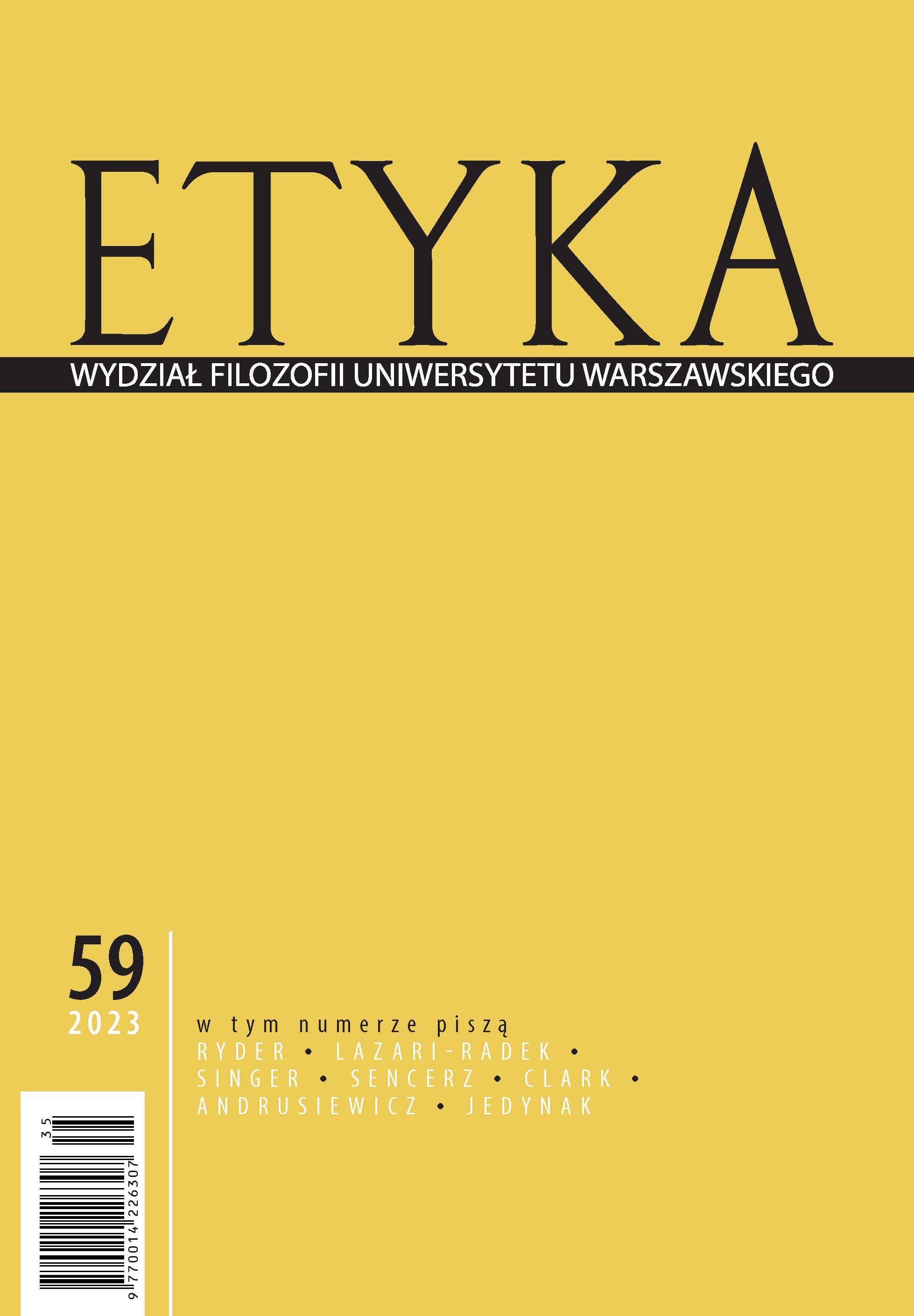Introduction to Call for Papers on Ethics of War
DOI:
https://doi.org/10.14394/etyka.1338Abstrakt
The field of war ethics changes its focus, and grows, in reaction to salient conflicts of the day – and this is how things should be. World War II made the deficiencies of contemporary law and policy crystal clear, remaining the obvious reference point up to this day. It was in reaction to the atrocities of the Vietnam War that Michael Walzer and others made just war theory relevant again, featured in military academies and politician’s speeches. The Iraq War inspired the so-called revisionists in just war theory and fixated military ethicists’ glance on the complex conundrums of counterinsurgency, while G.W. Bush’s War on Terror ignited debates on torture, use of private military contractors and targeted killing. Had these wars been different, contemporary ethics of war would have dealt with different problems, or at the very least it would apportion attention and expertise differently.
Consequently it is no surprise that the Russian invasion of Ukraine, launched clandestinely in April 2014 and escalated in February 2022, has generated its own ethical problems. A rare large scale, conventional, inter-state conflict, fought both with legacy Soviet systems and cutting edge contemporary technologies, the Russo-Ukrainian War is different from the asymmetrical, low-end (though not low harm) conflicts of the last thirty years. It is also marked by the almost complete disregard shown by the aggressor side to the issues of justice, both ad bellum and in bello ones. Indeed, as I write these words, use of nuclear weapons in offensive warfare is being openly threatened, and one is to assume, considered, by the Kremlin. Both frost and hunger are being weaponized against civilians, with the inhabitants of Ukraine being far from the only target, or casualty, of such policies. In a globalized world, the suffering is also global.
While the issue of ad bellum justice is uncharacteristically straightforward, many other questions are anything but answered. Nuclear blackmail, and nuclear-backed imperialism, stand out as theoretically underappreciated yet vastly important problems. So does the role of the global community in limiting the spillover effects of the war from hurting the most vulnerable. Devising an appropriate international response to crimes against humanity and acts of genocide committed by a nuclear power, yet by conventional means, offers another set of stark problems.
These heavyweight questions are just the very first ones that spring to mind when one contemplates the events of the current war. Russian attacks on power plants and heating stations, conducted at the verge of winter, unfortunately may be said to have some precedent in the actions of Western powers in Serbia and Iraq. Whether such attacks are legal under international laws of armed conflict, and, if they are legal, whether the laws should change is another subject ripe for debate. So is the issue of POW’s notorious vulnerability to wanton and needless cruelty, once again exposed by this war. The internment of Mariupol garrison commanders in Turkey seems to offer a glimpse of a solution far more civilized than the current system.
As far as the ethics of novel military technologies are concerned, the widespread use of armed drones, permeating to ever lower levels of military organization has major, though unclear implications both for the future of drones and that of autonomous weapons. Does the wildfire proliferation of armed drones prove the attempts to frame them as illegitimate, morally suspect weapons were naïve and futile? Or does it prove ethicists should double down their efforts to shackle such technologies in their infancy? The general problem is far from the only one. What about the use of drones or autonomous weapons that cannot be tied to a particular actor against critical infrastructure, such as the Nord Stream pipelines? How are such attacks to be responded to or deterred?
Regarding technology, this is also the first conflict of this size followed almost in real time by a truly global audience of sympathizers, spectators and trolls capable of impacting political and military outcomes through influence campaigns, donations, volunteer online work etc. It is clear that trying to sway one’s government to increase or cease support for a side of this conflict is not morally neutral, nor is transferring money for the war effort. How should we think of these new forms of extended participation in conflict? And given their importance, how should those who report the truth about the ugly realities of war proceed? What about pundits and commentators with large audiences – what are their responsibilities, and what standards can we expect of them? The questions that may be asked about the behavior of essentially private citizens may of course also be asked about the behavior of governments – and corporations. What degree of assistance to the victim state may be required? What degree of involvement with the aggressor state is permissible?
What these and many other conundrums placed in the spotlight by the Russian invasion have in common is that they need answers – most quite urgently. Consequently we invite a variety of learned and considerate voices to opine on these in our journal’s special issue. Among questions and doubts, one thing is certain – when confronted with the evils of war, we cannot stay silent, and we cannot cease to reflect.
Downloads

Pobrania
Opublikowane
Wersje
- 2024-11-18 - (3)
- 2024-11-18 - (2)
Jak cytować
Numer
Dział
Licencja
Prawa autorskie (c) 2023 Maciej Zając

Utwór dostępny jest na licencji Creative Commons Uznanie autorstwa 4.0 Międzynarodowe.
Prace publikowane w czasopiśmie ETYKA udostępniane są na podstawie licencji Creative Commons Attribution 4.0 International (CC BY 4.0). Oznacza to, że Autorki i Autorzy zachowują autorskie prawa majątkowe do utworów i wyrażają zgodę, aby ich prace były zgodnie z prawem ponownie wykorzystywane do dowolnych celów, także komercyjnych, bez konieczności uzyskania uprzedniej zgody ze Autora lub wydawcy. Artykuły mogą być pobierane, drukowane, powielane i rozpowszechniane z zastrzeżeniem konieczności poprawnego oznaczenia autorstwa oraz oryginalnego miejsca publikacji. Autorzy zachowują prawa autorskie do wspomnianych utworów bez innych ograniczeń.


